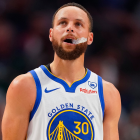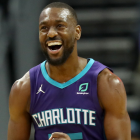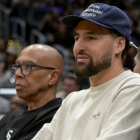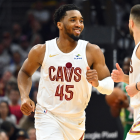Dwane Casey did a hell of a job. Let's start there. In his first season as coach of the Toronto Raptors, 2011-12, Andrea Bargnani was their No. 1 option and Aaron Gray started 40 games at center. The Raptors were coming off a 22-60 season, in which they finished dead-last in defensive rating, and he dragged largely the same roster to 14th. It might not have seemed like much at the time -- Toronto went 23-43 in that lockout-shortened season -- but it was the beginning of the most successful era in franchise history.
Since then, the Raptors have incrementally improved year after year, culminating in this season: 59 wins, the No. 1 seed in the East and the third-best net rating in the NBA in the regular season. Thanks to those marks and the new offensive system Casey implemented, he might win Coach of the Year.
If that happens, it will be a bit awkward. Casey was fired Friday, with Toronto president Masai Ujiri singing his praises in a more-emotional-than-usual press conference to announce the decision. Ujiri called the firing "the hardest thing I've done in my life," adding that Casey didn't necessarily do anything wrong, but "the time has come" to make a change.
"I don't think I'll work with a better person," Ujiri said. "Maybe my dad. But this guy is phenomenal. You know? A listener, a learner, a performer and a real person."
In many ways, Casey was a victim of his own success. He helped the Raptors go from an irrelevant team to a very good one, which put pressure on him and the front office to make them great. At the beginning of the season, few expected Toronto to win close to 60 games and be favored in a playoff series against LeBron James' Cleveland Cavaliers. When they found themselves in that position and fell (way) short, it looked like a massive failure. Might Casey still have his job if the Raptors hadn't overachieved in the first place? It's a fair question.
The reality, though, is that they did win all those games and they did, statistically speaking, fit the profile of an elite team. And for an elite team, their postseason performance has been rough. It is not simply that Toronto has kept losing to Cleveland, it's how it has kept losing to Cleveland: They have now lost 10 straight playoff games against the Cavaliers over three seasons, including two straight sweeps, and eight of their 12 playoff losses to the Cavs were by 18 points or more.
In 2016, Casey asked the slow-footed Luis Scola to defend Kevin Love on the perimeter. In 2017, Casey waited until Game 4 to start P.J. Tucker, the Raptors' defender, and match him up with James. This time, he started Jonas Valanciunas against Love until Game 4, and throughout the series Toronto was far too willing to switch smaller, helpless players onto both James and Love.
It is impossible to say that making better in-game adjustments would have swung any of these series the other way. In the playoffs, though, the margin for error becomes minuscule, especially against great teams and all-time great players. Casey's mistakes and slower-than-ideal adjustments do not invalidate the bigger-picture success he had, but he has guided the Raptors to a point where, unfortunately for him, they matter.
This firing is not an indictment of Casey or the seven years he spent in Toronto, five with Ujiri. It is about the next five or seven years. As Ujiri reflected on where the franchise has come from and where he wants it to go, he had to have asked himself and his staff if a different coach would have given them a better chance to advance in the playoffs. If their answer was yes, then they had to make this call.
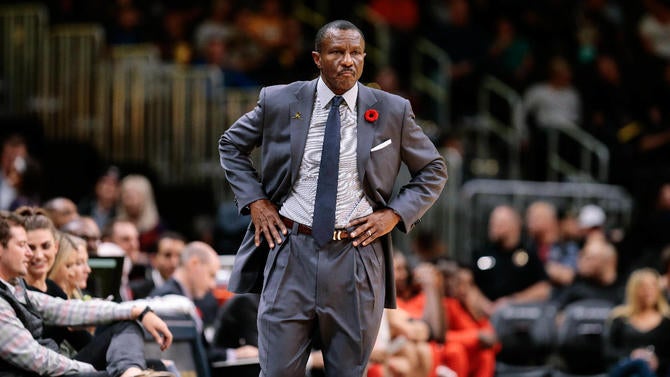
Seven years, by the way, is a damn long time for a coach to last in one place in today's NBA. Considering everything that Casey has been through during his tenure, it is a minor miracle that he lasted this long. Ujiri could have easily made a coaching change when he took over the front office in the summer of 2013. Less than two months into that season, Ujiri almost blew up the roster -- Kyle Lowry literally had his bags packed for New York before Knicks owner James Dolan backed out of a trade -- but the Raptors ended up turning their season around and making the playoffs, ending a five-year drought.
There was speculation about Casey losing his job after Toronto was swept by the Washington Wizards in the 2015 playoffs. He could have been fired the next year, too, but the Raptors barely avoided a first-round loss in a seven-game series with the Indiana Pacers and snuck by the Miami Heat in seven games to make it to the conference finals. When they were swept by the Cavs in 2017, many observers initially took Ujiri's famous "culture reset" comment to mean that he'd look for a new coach, rather than keeping Casey and changing their style of play.
Often, the coach that takes all the lumps at the beginning of a rebuild does not get the chance to see things through once things start falling into place. Ujiri chose to give Casey that chance, but after the Raptors went out with a whimper once again, it was clear that major changes were necessary. Replacing Casey will not fix everything -- Ujiri acknowledged Friday that the roster is imperfect -- but it is the simplest way to send the message that the status quo is not good enough.
Throughout Casey's time in Toronto, Casey loved saying that Toronto needed to be a "hit-first team" and play with "a two-by-four on our shoulder." He came to the team with a defensive reputation, and it never felt like the Raptors were quite tough enough for his liking. As he leaves, it is regrettable that Toronto never became a team that opponents feared or a team that could make James uncomfortable. It would be unfair to call this Casey's fault, but it is understandable that Ujiri wants to see if someone else can get it done.










